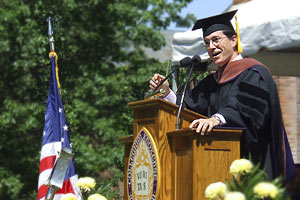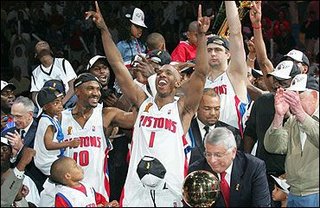Wednesday, June 28, 2006
The Right vs. The Wrong
- Anybody with the slightest amount of common sense would likely agree with the opinion articulated by Clarence Page.
- Anybody who is a shill for the Bush Administration is likely on this list of idiotic comments compiled by Media Matters.
"The Word"
My uncle had seen the speech Stephen Colbert delivered at Knox College (a school to which my uncle still donates) in the newspaper. He read me a couple parts from this passage, which I've highlighted in bold:
But you seem nice enough, so I’ll try to give you some advice. First of all, when you go to apply for your first job, don’t wear these robes. Medieval garb does not instill confidence in future employers—unless you’re applying to be a scrivener. And if someone does offer you a job, say yes. You can always quit later. Then at least you’ll be one of the unemployed as opposed to one of the never-employed. Nothing looks worse on a resume than nothing.Today, after spending eight hours on my "second interview"—which was really just shadowing another sales rep for the day—at the marketing firm in Chicago, we returned to the office. I filled out a brief questionairre about the day and about the job before the manager sat me down across from him in the office and asked me a few questions. It was short and sweet, and then he asked when I could start.
So, say “yes.” In fact, say “yes” as often as you can. When I was starting out in Chicago, doing improvisational theatre with Second City and other places, there was really only one rule I was taught about improv. That was, “yes-and.” In this case, “yes-and” is a verb. To “yes-and.” I yes-and, you yes-and, he, she or it yes-ands. And yes-anding means that when you go onstage to improvise a scene with no script, you have no idea what’s going to happen, maybe with someone you’ve never met before. To build a scene, you have to accept. To build anything onstage, you have to accept what the other improviser initiates on stage. They say you’re doctors—you’re doctors. And then, you add to that: We’re doctors and we’re trapped in an ice cave. That’s the “-and.” And then hopefully they “yes-and” you back. You have to keep your eyes open when you do this. You have to be aware of what the other performer is offering you, so that you can agree and add to it. And through these agreements, you can improvise a scene or a one-act play. And because, by following each other’s lead, neither of you are really in control. It’s more of a mutual discovery than a solo adventure. What happens in a scene is often as much a surprise to you as it is to the audience.
Well, you are about to start the greatest improvisation of all. With no script. No idea what’s going to happen, often with people and places you have never seen before. And you are not in control. So say “yes.” And if you’re lucky, you’ll find people who will say “yes” back.
Now will saying “yes” get you in trouble at times? Will saying “yes” lead you to doing some foolish things? Yes it will. But don’t be afraid to be a fool. Remember, you cannot be both young and wise. Young people who pretend to be wise to the ways of the world are mostly just cynics. Cynicism masquerades as wisdom, but it is the farthest thing from it. Because cynics don’t learn anything. Because cynicism is a self-imposed blindness, a rejection of the world because we are afraid it will hurt us or disappoint us. Cynics always say no. But saying “yes” begins things. Saying “yes” is how things grow. Saying “yes” leads to knowledge. “Yes” is for young people. So for as long as you have the strength to, say “yes.”
And that’s The Word.
We stood up, shook hands, and I start at 10 a.m. on Monday. It's commission-based, but it also has insurance and it's near Ogilvie.
For now, I'm just happy I had the chance to say "yes."
Tuesday, June 27, 2006
Picking A Favorite Can Be Hard
 So when I asked World Cup fan at work who I should root for once the United States had been eliminated (although I really wasn't all that surprised—or disappointed, really—by their failure to get out of their group; we're still years from soccer—or "football" as it's called, well, all over the rest of the world—gaining similar popularity here), she recommended Argentina.
So when I asked World Cup fan at work who I should root for once the United States had been eliminated (although I really wasn't all that surprised—or disappointed, really—by their failure to get out of their group; we're still years from soccer—or "football" as it's called, well, all over the rest of the world—gaining similar popularity here), she recommended Argentina.I seemed to remember
And they're pretty good too, she told me—although she admitted believing popular favorite Brazil would probably win the whole thing, and she herself was rooting for Mexico.
 Too bad about that heartbreaking, unstoppable game-winner that once again sent Mexico home early. I'm tempted to call the staff of the men's locker room at the country club I usedto work at and maybe ask them if now they're rooting for Argentina too.
Too bad about that heartbreaking, unstoppable game-winner that once again sent Mexico home early. I'm tempted to call the staff of the men's locker room at the country club I usedto work at and maybe ask them if now they're rooting for Argentina too.And you know what? Although I was tempted to cheer for the Netherlands, I think World Cup fan really knows my own taste in soccer teams pretty well.
Of course there are some people feel the World Cup is "an excuse to exploit girls."
What? I haven't the faintest idea of what the senator is talking about.
Hell In A Handbasket
"Being part of a party that has three or four different new approaches to Iraq beats the hell out of being part of a party that marches in lockstep off a cliff."And if there's any doubt what three-word phrase is getting run into the ground, take note of the running theme of this letter in today's Tribune:
"The Democrats are being chided by Republicans for not having anything about Iraq in their New Direction for America plan. The truth is that the Democrats have too many Iraq plans. They have the cut and run immediately plan, the cut and run at the end of 2006 plan, the cut and run by July 1, 2007, plan, the cut and run by the end of 2007 plan, and the begin to withdraw troops at the end of 2006, followed by a cut and run at some later unspecified date plan.Got that? Six times! Nice job, Mr. Graham. Karl Rove, I'm sure, is very proud.
The nation can always count on the Democrats to be with us at the start of a war, but after a short while, they always cut and run."
Monday, June 26, 2006
Knock On Wood
 THEM: "What is it you are looking for in this job?"
THEM: "What is it you are looking for in this job?"ME (thinking): "Money ... women in business attire ... "
ME (speaking): "Well, I'm really just looking for somewhere that I can grow and learn to be an integral member of a team."
THEM: "So which of these jobs has best prepared you for a career in the business world?"
ME (thinking): "None of them, really."
ME (speaking): "Oh definitely The Chronicle. I really learned a great deal there and was given a healthy amount of responsibility every week in managing my section."
And today he pulled a fast one on me ... giving a new variation to the strengths and weaknesses bit:
THEM: "So it says here you were responsible for training an assistant."
ME (thinking): "Uh oh ..."
ME (speaking): "Yes, that's correct."
THEM: "So if your assistant was sitting in that chair beside you, what do you think he—it was a 'he,' right?"
I nod "yes."
THEM: "And what would he tell me your biggest strength is?"
ME (thinking): "A high tolerance ... great ability to quote Bill Hicks ..."
ME (speaking): "Um ... probably by writing ability."
ME (thinking): "Research, you idiot! Say research!"
THEM: "And what would he say your biggest weakness is?"
ME (thinking): "Late every Friday ... Missed deadlines ... Smells like bourbon ..."
ME (speaking): "Well, probably that I didn't explain certain aspects of the job as fully as I could've the first time around."
The other new element to today's interview was that I was being grilled right alongside a female applicant. Luckily, most of the questions went her way first. So there were a couple of, "Yeah, like she said ..."
I wasn't going to get my hopes up too high about that "we'll be calling you" line. Yeah, I heard that twice last week and about the only people calling are the bank that's asking where their fucking money is.
But remarkably, less than ten minutes after leaving the office—in Chicago and not the lame suburban locations I was at last week, a major plus—my phone did ring. I was paying for a soda and couldn't grab it. And it wasn't the bank's phone number. It actually was the interviewer, seeking a more hands-on full-day second interview tomorrow.
It hurts when you just about shit a brick on the train, but I was stunned.
 Of course, I'm supposed to work at the restaurant tomorrow. But if you think I'd pass up going downtown tomorrow so I could sling waffles instead, well, no fucking way. I've never called in sick, but now would be the time.
Of course, I'm supposed to work at the restaurant tomorrow. But if you think I'd pass up going downtown tomorrow so I could sling waffles instead, well, no fucking way. I've never called in sick, but now would be the time.I have but one phone number for one of the waitresses at work—and she quit last weekend. But she's got the other girls' numbers and so I began placing calls late this evening. First girl didn't answer, second girl has plans tomorrow, and I was already perfecting my "sick voice" for the morning before the third girl was only too kind to say, "Sure."
Her interest in the World Cup had already given me a high opinion of her, but now she's been moved up on to a pedestal. "I owe you," I told her—thinking immediately that I should ask her what she drinks. But we'll worry about that later. Right now, it's back to rehearsing those answers.
Repeat after me: "Research ... research ... research ..."
One Of "Those" Weekends ...
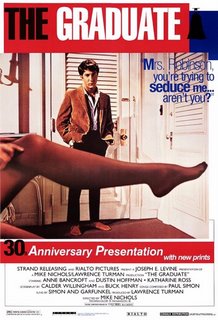 "Be patient," they tell me.
"Be patient," they tell me.Nobody finds the real job right out of school, they say.
"You have lots of options."
One of the more talented broadcast majors at our graduation ceremony—during his own moment when the college had the continuous video feed of every graduate's handshake with the college president at the ceremony—held up a hand-scrawled note with the station letters he was going to work for. I remember smiling/laughing when I saw it. I was in a good mood that day, of course, but now I'm wondering if I should've—could've, done more to prepare for breaking the ice that is my entry into the "real world."
There's two more of those "entry level" job interviews scheduled for this week, which is good. If GIBS still hasn't found work yet with her newly acquired Master's degree, then I shouldn't be too hard on myself.
Or at least I tell myself that.
We have to. There's no second option.
There are, however, second jobs. And most—if not all—of the other waitresses have those. Even the girls back in town only for the summer. And now everyone seems to be lamenting about the days when business was much, much better for us.
"There used to be lines going out the door," one says.
And in my short time at this place, I too remember when we were far, far more bustling with business. Of course, I was showing up late then and somehow managed not to get fired. So the fact that lately I've been doing better about showing up on time hasn't been noted all that greatly because I really haven't missed all that much.
Friday amounted to me arriving a couple of minutes late and ending up with what I broke down to being the equivalent of less than $10 an hour. By basic principle, for serving standards, that's inexcusable.
I'll make no bones, however, about having to work for a living. It's all fine and good as long as I'm rewarded for my effort. That's all I ask.
 The fellow she'd been speaking with has apparently been very big on recommeding her. As well he should be, but I've been growing somewhat tired of hearing about the connections she's made still without finding a job. After all, if somebody with her qualifications is still searching for work, then I have no idea how that bodes for my own future.
The fellow she'd been speaking with has apparently been very big on recommeding her. As well he should be, but I've been growing somewhat tired of hearing about the connections she's made still without finding a job. After all, if somebody with her qualifications is still searching for work, then I have no idea how that bodes for my own future.She asks me if I want to go out with her and a friend for Geneva's annual Swedish Days festival, and I say that after Friday's lackluster earnings at the restaurant, I want to really, really dedicate the evening to finding something—anything else for work. I'm tired and frustrated, which is always a bad element to have before going out to drink.
You can guess what happened next.
He and his wife are headed out to the "beer garden" at the festival. GIBS and I are supposed to be headed out there too, I tell him. But we're waiting for her friend ... who ends up arriving a couple of hours late.
By that point, I've joined RF and his wife before GIBS and her friend have even left. RF's wife feels somewhat ill, leaves early to go home, and so he and I agree the beer garden sucks a fat dick (Seven dollar entry fee, by the way, to see ... I don't know, some sorry-ass Dave Matthews cover band or something, I guess).
When GIBS calls, RF and I arrange to meet at the bar along the river. He's drinking vodka & tonic now, which catches me off-guard since this is the guy who usually drinks SoCo. But I share his newfound drink of choice—sans tonic.
The four of us end up talking for an hour or so before mutually agreeing we should head back to what—for GIBS, her friend, and myself—is our typical watering hole. We somehow lost RF along the way during the walk uphill. But, as it turned out, he just stopped by the restaurant another one of my buddies worked at—inviting him too to come out.
When he shows up at the bar, I offer to call him—and myself—a cab. But then, upon leaving, he says he'll walk.
And his walk is a long one. But I call the cab company back and cancel both cabs, now having decided to walk myself.
 I am scheduled to work at 8:30 the following morning.
I am scheduled to work at 8:30 the following morning.And, boy, am I hurting.
Cheap, domestic draft beer does that to you. Either way, I need to work. And nothing is helped by our business—or lack thereof.
It is not a financial windfall of a day, and matters aren't helped any by the end—in which I think I'm ready to leave and, instead, the hostess informs me that I have a check still "open."
Looking at the bill, that particular table immediately comes to mind: a family of four in which a young couple and their apparent parents, along with child requiring a high-chair at the table's end.
They had said everything was fine.
But maybe it was not. And now, they—apparently—walked out on their bill. The damage, you ask?: $40.
Keeping in mind that I work at a family restaurant (i.e. "family"-owned), this is the bosses' mother's response to the revelation:
"You're gonna' have to pay for that."
Of course, keeping in mind that this is America and that capitalism reigns supreme here, my response—internally: "Fuck You"—externally, is, "No, I won't."
And I KNOW I'm right.
Why?
Well, I've known a number of waitresses who have detailed their stories of tables walking out on their checks; each time, it's the waitress in question who is required to foot the bill. One girl who had just started at a local bar watched an entire night's worth of tips go down the drain because her final table walked out on a $100+ tab.
There is nothing derogatory about me openly wishing people such as those who utilize someone's physical services—and then not paying for them—should burn in the firiest pits of Hell. It's almost enough to make me want to become a Christian.
And as sad and unfortunate as every "dine-and-ditch" is, there was a quite reasonable logic behind my own argument that Saturday: I'm not responsible for my "bank."
 As though the cheap bastards who decide to pull this stunt aren't bad enough, nothing could be worse than a restaurant in which the owners prefer to rely on their front desk to manage their money—and consequentially blame their servers for not collecting the money they trusted somebody else to collect anyway.
As though the cheap bastards who decide to pull this stunt aren't bad enough, nothing could be worse than a restaurant in which the owners prefer to rely on their front desk to manage their money—and consequentially blame their servers for not collecting the money they trusted somebody else to collect anyway.Nothing could be more insulting.
So when the shift ended with my boss saying he'd talk to me about it "tomorrow"—I told him I wouldn't be in again until Tuesday—I could hardly wait long enough for the bartender to fix me one of his Long Islands.
"How was work today?" he asked.
"It sucked," I said—quite matter-of-factly.
He mentioned that if I thought my shift sucked, I should consider that he was in for what was basically a two-hour shift. Pretty shitty, indeed.
But still, I had a graduation party to go to.
I not only showed up drunk; I left perhaps even more drunk.
That had been, once again, another bad day. A former co-employee and I had done a pretty good number on a bottle of scotch while chilling out, and I had been invited to take some with me on the train.
Not pretty.
So besides arriving wasted, I tried to duck out with another former editor who had invited me to go get, uh, "stoned." After one look at me while walking with his friends, his buddy whispered something in the ex-editor's ear, and suddenly our plans to go hang out weren't happening.
Go figure.
I was scheduled to work at 8:30 the following morning. And that was roughly around midnight.
So when I was awakened while lying on my back on the sidewalk of some nearby neighborhood, I sat up to a dude offering a ride home.
"You don't want to drive that far," I told him.
And when his buddies laid on the horn at two in the morning, he ran back to the car and disappeared. I, meanwhile, sat there on the sidewalk, looking around and wondering how to get back home.
I finally found my way to the Blue Line, where a friend had offered to pick me up from O'Hare, crash at his place, then give me a ride home before work that morning. I'm looking at the Blue Line map and counting how many stops I am from O'Hare. The last one before the end is Rosemont, and when I hear that announced with the moon still out, I figure I'll safely make it to work on time.
 When I opened my eyes, the sun was out. It was 8:00 a.m. and the Blue Line was now headed back to Chicago. I hopped out at the exact same stop as the one for the party. After catching the next outbound Blue Line, the phone rang with our teenage hostess saying the boss' mom wanted to know where I was.
When I opened my eyes, the sun was out. It was 8:00 a.m. and the Blue Line was now headed back to Chicago. I hopped out at the exact same stop as the one for the party. After catching the next outbound Blue Line, the phone rang with our teenage hostess saying the boss' mom wanted to know where I was."Um, O'Hare."
"He's at O'Hare," I hear her saying with the boss' mom shouting in the background.
I arrived at work two hours late, berated by my boss.
But not fired.
Gonzo's ride is a Ford Tempo—ironically, what was nearly my first car. And just as I was beginning to think that I couldn't stomach another night of domestic beer consumption, Gonzo informs me of the good news that he's gone through the trouble of bringing a handle of Jim Beam.
My gift was a Hot Wheels Chevy Impala, citing that this was the nicest car I could afford.
Chicago Ridge was a bit of a haul and the turnout was pretty good considering the number of other events going on in the city that weekend (i.e. Intonation, Gay Pride, etc.). I'm a bit shy around faces I'm not familiar with—oh, that is unless there is the reliable social lubricant that is alcohol. While Gonzo plays it smart by mixing Coke, I decide to forgo a mixer.
Bad move.
I'm fine enough for the first hour or so, finally starting to forget about my shit job. There's some delicious homemade ribs, a swimming pool, and ... karaeoke? Normally, I dismiss participating in favor of watching others (that "bit shy" thing again). Just a few weeks ago, I went to a place in Chinatown for a friend's birthday party and saw perhaps the most amazing rendition of David Bowie's "Ziggy Stardust" I've ever seen.
 On this particular Saturday night, my stage fright doesn't seem to be gripping me. Partly because it didn't seem everybody in the "audience" was paying attention, and mostly because I've refilled my cup.
On this particular Saturday night, my stage fright doesn't seem to be gripping me. Partly because it didn't seem everybody in the "audience" was paying attention, and mostly because I've refilled my cup.My performances are a series of diminishing quality. While I'm disappointed that Janet Jackson's "Escapade" is not available, Johnny Cash's "A Boy Named Sue" is always a safe bet for me. I should have just left it at that.
But no, following a conversation with one of the waitresses earlier in the day about a Backstreet Boys song on the radio in the dining room, I actually sign up for "I Want It That Way." This is a song that might have been more appropriate for, say, a junior high graduation. At a college graduation, well, I think Ozzie Guillen might have a word to describe what to think of me.
And again, I should have just left it at that.
But no, perhaps driven to reclaim my masculinity or perhaps driven by another cup refill, I sign up for Young MC's "Bust A Move." RF has performed this for years and made it look easy. I know the words to this too, I tell myself. But upon being called to the microphone once again, the words come up much faster than I remember them. My version went something like this:
"This here's ... la duh the to uh nah nah the duh nah ..."You get the idea. I'd say I didn't finish the song if I actually thought I started it.
We had been invited to crash at the house, but thanks to my early passing out and probably some justifiable concern about whether or not I would vomit (I didn't, for the record—not that I'd trust my memory), Gonzo is forced once again to actually having to carry me back to the Tempo. He is one strong Pollock.
Ha.
Instead, I'm on a leather couch back at Gonzo's home. He's up before me and already shaking his head. I don't want to ask how the night ended, but I know I'm going to hear about it anyway. I don't feel the painful, headache-type hangover I had Saturday morning, but rather the woozy, "I-think-I'm-still-drunk"-type hangover.
Gonzo and I go to grab some breakfast before dropping me back off in Maywood. The trains on Sundays don't run quite as often, so when Gonzo actually suggests grabbing a round or two somewhere ("Mugshots" sure looked, uh, "cozy"), I say we should err on the side of caution. If I miss the train, it's another four hours until the next one, and Gonzo has already done a remarkable job of keeping me entertained—or babysitting me.
 Hopping on my bike and still a little wobbly, I pass by a man sitting in a lawn chair on top of his van parked in his driveway. He is very enthusiastic about the parade from what appears to be a terrible view. And there are people dressed up as storm troopers walking down the sidewalk. And a German polka band. Strange people everywhere you looked.
Hopping on my bike and still a little wobbly, I pass by a man sitting in a lawn chair on top of his van parked in his driveway. He is very enthusiastic about the parade from what appears to be a terrible view. And there are people dressed up as storm troopers walking down the sidewalk. And a German polka band. Strange people everywhere you looked.Not me, though. No sir, I'm normal.
I try my best to avoid the parade, just get to my uncle's and then come home and take a very long nap. To say the weekend was "eventful" seems like an understatement.
Of course, the first thing my uncle asks me is, "So didja' find a job yet?"
*SIGH*
Wednesday, June 21, 2006
To Start Or To Join A Chapter?
Animated
Be Very Afraid
First, Cole's post yesterday elaborated on two Democratic plans as opposed to the "stay the course" mantra of Republicans in Congress—or as Cole calls it, "Stay and Stay, Spend and Spend."
That amount being spent is $5 billion a month, which Cole uses a picture from his Detroit-area residence to demonstrate areas of this country that could truly benefit from such wasteful spending:
"Could we please have just one of those $5 billion dollar installments you are squandering in Iraq, Mr. Rove, to -- you know-- fix up Detroit a little bit. I'd say those windows need replacing. And since you painted all those schools over there, maybe you wouldn't mind painting some of the buildings in my area. We don't have any oil, but we have a helluva port and enormous industrial capacity. It is just that, you know, the Federal government has been busy rebuilding a foreign country (which somehow still seems to be in flames and run down, despite having its own petroleum). And somehow my city just isn't a priority. In fact, you can correct me if I'm wrong, Mr. Rove, but my recollection is that neglect of Detroit has driven its population below 1 million, and that as a result, the Federal government actually cut back on the aid it gives the city. Is that really good urban policy? Wouldn't it make more sense to bring Detroit back to life and reinvigorate the American Midwest?
Is it cut and run? Or is it 'withdraw and spend American money on Americans'?
And what is the Republican plan? Is it "Stay and stay, and Spend and Spend?"
Secondly, Cole had a link to an appearance he made with Lawrence Wright on Open Source with Christopher Lydon. It's worth listening to, but Lydon's "Post-Game Analysis" might have hit the nail on the head:
That was a serious and subtle hour that shouldn’t be reduced to bumper stickers… and still: what sticks in my mind at the end of the day is Juan Cole’s line about historical precedents for our predicament and Iraq’s. He writes :
"We are at the beginning of 1983 and we are the Soviets in Afghanistan…"
Juan Cole, Bush’s Abuse of History, Snow’s Battle of Bilge, Informed Comment, June 19, 2006
No need to remind anybody how that turned out ...
"Paying Your Dues"
Let It Get Ugly
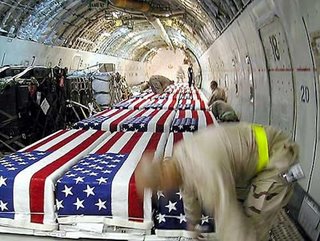 Well, it has been, like, almost an entire week since something has been written here about politics. And considering how ugly this most recent story of two kidnapped U.S. soldiers in Iraq is playing out, now's as good a time as any.
Well, it has been, like, almost an entire week since something has been written here about politics. And considering how ugly this most recent story of two kidnapped U.S. soldiers in Iraq is playing out, now's as good a time as any.I watched the NewsHour with Jim Lehrer this evening and learned about Zarqawi's al Qaeda successor personally performing the executions. I realize that when the press refers to these sort of actions, descriptions like "slit the throats" or "beheadings" connotes an image of quick death—like the single swipe of a sword or knife. But anybody who saw the tape of the Nicholas Berg beheading knows just how far that is from the truth. The deaths are neither quick nor certainly not painless.
But when it came to analysis on the NewsHour, guests Lawrence Wright and Alexis Debat really offered up some more chilling insights (emphasis added):
LAWRENCE WRIGHT: Well, it was, you know, the Zarqawi organization which in the beginning was independent of al-Qaida. He had always kept a certain distance between himself and bin Laden, although, as Alexis notes, there was a sponsorship on the part of the Egyptians.When he got to al-Qaida, he made himself known by blowing up the U.N. compound, by attacking moderate Shia, by killing one of the major ayatollahs there, and then made application to join al-Qaida.
And, for about a year, there was deliberation apparently over the issue of how much he should target the Shiites in Iraq. And, finally, bin Laden did endorse him and allowed him to use the brand name of al-Qaida. And that's how we got al-Qaida in Iraq.
JIM LEHRER: Is going after these American soldiers a shift in what the recent strategy was under Zarqawi?
LAWRENCE WRIGHT: Yes. Zarqawi was really targeting Shiites; he was not really after the Americans. His goal was to provoke a civil war.
And I think that both bin Laden and Zawahiri looked at that as a losing strategy. And Zawahiri cautioned him about this and said, you know, are you going to try to kill all the Shiites? Has this ever been possible? He really was opposed to this particular plan.
If we have one of Zawahiri's men in control now of al-Qaida in Iraq, then I think what we will see is a recalibration of the strategy. They will be focusing on American troops; they will not be focusing on the Shiites.
JIM LEHRER: Do you agree with that?
ALEXIS DEBAT: Absolutely. I think the fact that he targeted American soldiers, also the fact that there's no videos.
Remember, in the letter that surfaced a few months ago, Ayman al-Zawahiri criticized Abu Musab al-Zarqawi for his gruesome videos on the Internet, and namely the Nick Berg video. So no videos this time, which that could be an indication that al-Qaida in Iraq is going to be much -- run much closer to al-Qaida central's goals.
Also, al-Masri was very much involved, apparently, in setting up networks abroad. So the two parts, the pillars of the recalibration that Mr. Wright was talking about would be a greater focus on American troops in Iraq and also a greater focus on operations abroad.
 Um ... so does anybody else think this might be a good time to try putting together a, you know, real exit strategy from Iraq?
Um ... so does anybody else think this might be a good time to try putting together a, you know, real exit strategy from Iraq?
Naturally, reaction to the two deaths—and any further public opinion against the war because of it—was immediately being grossly spun by that beacon of truth, Rush Limbaugh. And if relatives chose to be critical of the disappearances and deaths, well, then they're just reciting "Democratic talking points."
When he's not running for president and trying too hard to appeal to moderates, John Kerry can still occasionally cut through such nonsense:
"Stay the course is not a plan. And what this administration wants is to have a fake debate, as usual. There, there, you hear the drumbeat on every television show from every commentator: 'cut and run,' 'cut and run,' 'cut and run,' 'cut and run.' That's their phrase.They've found their three words, they love to do that, and they're gonna try to make the elections in November a choice between 'cut and run' or 'stay the course.' That's not the choice. My plan is not 'cut and run.' Their plan is 'lie and die.' And that's what they're doing..."
Of course, Bush and members of his party in Congress do have a plan for withdrawal: Let it become the next guy's problem.
Monday, June 19, 2006
What's in a name?
What to do, what to do ...
On the other hand, as if I haven't already had my say on abortion, what's shakin' in Louisiana is the state just jumped on the moronic bandwagon. Terrific.
To keep my mind on things less likely to bring a rant out of me, I'll just watch this hockey game while boozing with Gonzo and filling out this little survey I saw over at Write On:
("Your answers are limited to one word and one word only. No explanations.")
Argh ... Carolina just went up 2-0. In a word: Figures.Yourself: Insecure
Your Lover: Salma
Your Hair: Thinning
Your Mother: Loony
Your Father: Provider
Your Favorite Item: Pen
Your Dream Last Night: Strange
Your Dream Home: Oceanfront
The Room You Are In: Office
Your Pets: Stuart
What You Are Now: Better
Who You Want to be in Ten Years: Responsible
What You Want to be in Ten Years: Content
What You're Not: Dishonest
Your Best Friend: Listens
One of Your Wishlist Items: Apartment
Your Gender: "Skirt-chaser"
The Last Thing You Did: Smoked
What You Are Wearing: Tie
Your Favorite Weather: Fall
Your Favorite Book: Sedaris
The Last Thing You Ate: Eggroll
Your Life: Colorful
Your Mood: Frustrated
Favorite article of clothing: Boxers
Favorite color: Blue
School: Lengthy
Song: "Anarchy ..."
Sunday, June 18, 2006
Vacation/All I Ever Wanted/Vacation/Had To Get Away/Vacation/Meant To Be Spent Alone
But for now, nothing irritates me more than not being able to disprove this.
Friday, June 16, 2006
Stop Making Sense
"Don't you need to know the person for at least a year?" I responded.
And it was all downhill from there.
What I thought was protecting the honesty of her qualifications became her interpretation of my fear of association—committment, more specifically.
So Gibs got rid of me rather quickly, we exchanged a few text messages during Edmonton's improbable Game 5 victory in Raleigh, and we were back on the phone before the shorthanded overtime game-winning goal.
Our differing points of view did nothing to resolve the situation, and Gibs maintained I was not, in fact, simply looking out for her best interests. They just wanted a name, she explained. One they wouldn't call, but just a fucking name.
But if it really were just a name, of course, then my caution of "not really knowing me that long" isn't all that big a deal. There are plenty more honest acquaintances who can further your chances better than me, I thought.
Wrong.
After work today, Gibs and I meet up for a drink at the bar so I can take advantage of good, cheap burger night. "I'm only staying for one," she says, explaining her money situation. Fine. Fair enough.
The regulars show up and sure enough, that's enough to make her hang around for another. A gentleman I've met before, but cannot remember the name of upon being reacquainted, sits beside her and talks with us for quite a while. He's a good guy, buying me a drink and talking about the NBA Finals.
He remembers meeting me, thinking I was dating Gibs and asks me why I'm not actually dating Gibs. He seems to like her. He says she's cute, and asks me if I think she's cute, and of course I think she's cute.
I say something to the effect of us wanting "different things"—presumably meaning kids, marriage, etc. But that's not good enough. So I elaborate with, "She wants more certainty."
In a relationship, I meant. But he understood. He was older than both of us.
But Gibs is older than me, and this year's been different simply because of continually being involved with someone older than me—which is still basically foreign. Their expectations seem wildly more haunted by past heartbreak than I'm used to.
And so when Gibs explained (with some overexaggeration, might I add) to said older gentleman my hesitance (or, outright refusal, if you took her explanation of it) about the whole meaningless "reference" incident, I think he should have come away with a very good idea about why I'm not trying to date Gibs.
She called the thing off because of the exact reasons I listed for us being different types, although even then, she didn't want to seem to say there was anything wrong with me, you know, "as a person." I could respect that.
But we resolved to maintain a friendship because she tells me I'm "sweet" and I say, "You're sweet too."
It's a sickeningly sad story of two people who both see each other as genuinely nice and kind human beings, but are too nice and kind to admit to the other that they cannot form—no matter how much either has tried—any genuine long-term benefits to merely considering a relationship. Rather, they ignore that and cater to random moments of shared sexual interest.
That, of course, is okay—for now.
But sooner or later, somebody is going to finally break that kindness bubble and just say that they've met somebody else, or they want to see somebody else, or they simply just do not want to see each other any more. And that's when the "friendship" part of the deal really holds up if it's genuine.
And for some reason, I'm hoping that the person that buckles first and says we can't keep doing this is her. After all, I don't want to suddenly become viewed as an asshole.
Tuesday, June 13, 2006
My New Roommate
Seeing as I'd transformed sis' old bedroom into my third room (hey, the computer's in there), I did my usual routine: put off cleaning it up until days before her arrival and just move all of my shit from one room to one of the other two, leaving it still completely unorganized.
 Sometime in the fall, the light fixture on the opposite side of my actual bedroom went out. Thus, with no windows in that room of the basement, it was completely in the dark. For a short while, I placed a lamp by the door, which shed perhaps twice as much light (at best) on things as when I found my way around the room using the glow of an open cell phone.
Sometime in the fall, the light fixture on the opposite side of my actual bedroom went out. Thus, with no windows in that room of the basement, it was completely in the dark. For a short while, I placed a lamp by the door, which shed perhaps twice as much light (at best) on things as when I found my way around the room using the glow of an open cell phone.Then, one night, I broke the lamp.
For the entire spring semester, that bedroom has had no light in it. This used to be a major selling point of that space. On an off-day, with no light coming in, you could sleep in as late as you wanted, roll out of bed, and realized you just slept the entire afternoon away.
But my regular routine while in school every week was to fill up my now 10-year-old backpack with old assignments, various loads of printouts, and folded copies of the Chicago Sun-Times, Chicago Reader, etc.
Then on the weekend, after coming home from work on Saturday afternoon, I'd remove that week's papers, lump them on the floor, and forget about them.
During the break between the fall and spring semesters, I began collecting some to send out to the curb to be recycled. I ended up filling seven grocery bags.
In the preocess of cleaning sis' old room out for her arrival, I added to the sea of paper that more or less makes up our basement's floor. Deciding it was time to finally begin rediscovering what color the carpeting actually is, I went to that consumer-friendlier Wal-Mart (i.e. Target) and bought a couple of new (albeit, cheap) lamps.
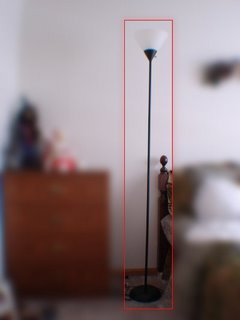 One was simply a desk lamp and needed only to be plugged in. The other was a stand-alone that required a bit more effort. When finished, the base resembled the picture on top of the box. But the shade was tilted slightly to one side, despite my six attempts to screw it in straight. The finished product resembles something like a frosted martini glass with a very long black stem and the top of the bulb inside visible over the rim of the shade (gelato?).
One was simply a desk lamp and needed only to be plugged in. The other was a stand-alone that required a bit more effort. When finished, the base resembled the picture on top of the box. But the shade was tilted slightly to one side, despite my six attempts to screw it in straight. The finished product resembles something like a frosted martini glass with a very long black stem and the top of the bulb inside visible over the rim of the shade (gelato?).When I turned the switch on that device, the room lit up like I hadn't seen it since probably last summer. And the scene was horrible. I looked back at my crooked lamp, and it now resembled something like a animated stick figure with it's head tilted to the side, as though it were disappointed with me.
I began aggressively clearing up the floor of the additional space outside the bedrooom this weekend with my Saturday off, and while gathering up my collection of Sun-Times from May, and April, and March (etc.), I thought I saw a black blur streak by out of the corner of my eye. I walked toward that part of the room, over by the additional bed and the entertainment center. I was holding a rolled up copy of one newspaper when out from under the bed scampered a tiny grey mouse. Its body couldn't have been any bigger than a golf ball. If this thing took a shit, it would be a speck.
It stopped at the corner of the CD racks and ran its paws over his face, either unaware or unconcerned that there was a 6'2'' human being now standing over it. I placed the newspaper on my bed and grabbed something with a much harded spine to smash the critter with. And so now I was armed with my journal.
But the mouse scurried underneath the CDs. I went to the opposite side and banged the side with the journal, sending the mouse back out the side from which he entered.
It stopped there in the open ... and again began running its paws over its face. I held my journal over my head and internally debated about which was the more effective way of striking a death blow: using the spine of the book would result in a more forceful, more direct strike; but using the entire back would increase the odds of actually scoring a hit.
 But as I stood there, procrastinating and procrastinating again, the mouse turned and went back under the CDs. I went to meet it on the other side again, but it was already racing against the wall, toward a corner where a poorly-constructed area where the siding was curling up. The mouse paused in the corner for a second—as if to mock me—and then snuck into the little opening and disappeared to the other side.
But as I stood there, procrastinating and procrastinating again, the mouse turned and went back under the CDs. I went to meet it on the other side again, but it was already racing against the wall, toward a corner where a poorly-constructed area where the siding was curling up. The mouse paused in the corner for a second—as if to mock me—and then snuck into the little opening and disappeared to the other side.I could have gone around to that area of the basement—our storage—but I just set the journal onto the bed, looked at my floor, and saw that the carpeting is beige. I resumed pick-up.
"I've got a new roommate," I told GIBS at the bar on Monday night.
She squinted, making the "W.T.F." face, and I explained.
"I'm going to call him Stuart," I said.
GIBS shook her head. She said she'd freak out anywhere she saw a mouse.
"But he's so small," I reasoned.
She rolled her eyes. But GIBS is right. So now I know what must be done.
I saw a mouse once before, when I first moved into the basement. My friend loaned me one of the industrial mouse traps that they used for his company's warehouse. They were big metal boxes, strange contraptions you wound up. I don't remember catching anything before I returned it to him, but I don't remember seeing a mouse again either.
Still, the last thing I need to happen is to be watching a movie on the bed in that extra room and to have the little critter racing out in the glow of the television screen, causing a girl to jump up and say:
 a) "Kill that thing!"
a) "Kill that thing!"b) "I'm outta' here!"
or
c) "I'm outta' here—and you oughta' kill that thing!"
So I've decided that following work on Thursday, I will walk over to the hardware store, purchase a number of the old-fashioned mouse traps, and leave Stuart's untimely demise to be the fault of its own curiosity. That, or its own hunger.
Clearing Up The Blackout
I understand I also tried to jump off a bridge. That was one rough weekend.
Saturday, June 10, 2006
Late Night Essay on: Abortion
Start with John O'Sullivan's May 30 piece, entitled "Do you really know our abortion law?":
As someone who goes to political dinner parties on both sides of the Atlantic, I have the following two experiences on a regular basis:Pretty gimmicky little lead, but I was interested to see where this was going:
Experience One:
American liberal: "Our American obsession with abortion is so embarrassing. Why can't we be like Europe? They're much more sophisticated. It's not even a political issue there."
Myself: "Well, that may be because the laws in most European countries are much stricter than those in the United States. Women have no constitutional right to an abortion. In Britain, for instance, except in cases of severe handicap, abortions are not permitted after the 24th week of pregnancy."
American liberal: "What! That's barbaric."
Experience Two:
European sophisticate: "You Americans are too absurd -- your fundamentalist Christians, all this political fuss about abortion. How do you explain such an obsession?"
Myself: "Well, that may be because the courts have ruled that there can be no restrictions on a woman's right to an abortion. An abortion can be performed on a fully viable fetus -- even, in the case of partial-birth abortion, as the baby is leaving the womb."
European sophisticate: "What! That's barbaric."
In other words, what people think about abortion -- more precisely, what they think they think -- is strongly influenced by what they know. But the ignorance of most people, including usually well-informed people like my dinner-party companions, about a topic that has been as controversial for as long as abortion does seem to call for explanation.Okay, stop right there. Ramesh Ponnuru? (Full disclosure: Ramesh is not a friend and he really didn't impress me when he was on the Daily Show last month, which I watched where I used to edit.)
Ramesh Ponnuru provides exactly that in his new book, The Party of Death (Regnery Publishing), about the politics of abortion, stem cell research and cloning. (Full disclosure: Ramesh is a friend and the senior editor on National Review magazine, which I used to edit.)
Ponnuru deals, first, with the nature of people's ignorance. Most Americans, let alone most European sophisticates, have no idea that the landmark Supreme Court decision, Roe vs. Wade, establishing a constitutional right to abortion, means that a woman can obtain an abortion right up to the moment of her baby's birth. When this claim is advanced, they point out that Roe specifically insists that states may regulate abortion in the second trimester and prohibit it in the third trimester.And that was just about where I lost it. I shook my head reading the rest of the op-ed, still stuck on that rather cheap way of portraying things. Pro-Lifers really like to hammer that one home: the "partial birth" argument is the ace up their sleeve. And, hey, if Ann Coulter can sneak a mention of it into her recent conversation with Matt Lauer—it must be a good argument, right?
But Roe also states that states can neither ban nor regulate abortion in cases where a doctor certifies that a woman's life or health would be adversely affected. And in a second Supreme Court judgment, Doe vs. Bolton, delivered that same day, Justice Harry Blackmun wrote that the doctor's medical judgment should be exercised "in the light of all factors -- physical, emotional, psychological, familial, and the woman's age -- relevant to the well-being of the patient." In brief: unfettered choice posing as a clinical decision.
Roe and Doe together allow a woman and her doctor to have a legal abortion for any reason at any time before birth, and arguably even during birth. The courts have confirmed this in countless cases, but especially in those striking down state and federal laws to prohibit or regulate "partial birth abortion" -- i.e., the procedure in which a baby is partly delivered and, while in the birth canal, has his or her skull crushed and his or her brains sucked out.
But set aside the partial birth thing one moment. A little more than a month before I read this piece, Melissa Simon wrote this in the Sun-Times on April 24 under the headline, "Who decides fate of 13-year-old rape victim?: I hope that politicians and voters will consider the facts about abortion.":
I was appalled when I heard South Dakota's governor declare that he signed an abortion ban into law because "unborn children are the most vulnerable and helpless persons in our society." As an obstetrician-gynecologist working at a major teaching hospital in Chicago, I treat women and girls every day who are in desperate need of reproductive health care services, ranging from abortion to counseling about contraceptives and prenatal care. One day is seared in my memory forever as an example of why the services we provide—including safe, legal abortions—are so essential.And after just reading that, I almost did, too ...
My first patient that day was a scared, 12-year-old girl who was 22 weeks pregnant and wanted an abortion. She came into the clinic sucking her thumb and gripping her mother's hand. The girl claimed to have a boyfriend in the eighth grade. She had no knowledge of or access to contraception and had never been taught about sex either at school or at home.
Next, I treated a pregnant 13-year-old who had been raped by a 19-year-old man. She came to our clinic accompanied by her mother, while her seven younger brothers and sisters were in school. I will never forget the shame and fear in this young girl's face as she clutched her teddy bear and told me her story.
My third patient was another 13-year-old, who had been molested by her mother's boyfriend and was 23 weeks pregnant. She was brought into the clinic by a cousin. As I listened to this girl's story, I began to cry.
When I think about "the most helpless and vulnerable people in our society," I see the faces of the three young girls I treated in that one heartbreaking day. What compassion are we showing when we force a frightened girl to become a mother at age 13? When we prevent girls and boys from learning about contraception, setting them up for unintended pregnancies that could easily have been prevented? These girls need empathy and treatment, not laws and regulations that prevent them from getting the health care services they need.And while Simon's column preceded O'Sullivan's, this morning's letters to the editor in the Sun-Times made me feel a little better when it began with "Got abortions all wrong":
A small but powerful group of extremely conservative politicians is working to ban abortion, deny emergency contraception to victims of rape, and teach young men and women that abstinence from sex is their only option to prevent pregnancy and sexually transmitted diseases. If these trends continue, I expect I will face many more heartbreaking days treating women who are the victims of policies that deny them access to safe, evidence-based health care.
Here are some facts that I wish more politicians would consider: Abortion is one of the safest medical procedures performed in the United States. Because abortion is so contentious, it has been widely studied and scrutinized, and we know that the risk of death or complications from either medication or surgical abortion is very low -- lower, in fact, than the risk of dying from childbirth. Mental health concerns are often raised as an objection to abortion, but while some women report feelings of sadness or guilt after having an abortion, their most prominent response is relief. We know from examples around the world that banning abortion only hurts women by driving the procedure underground and increasing the risks of substandard care.
Thirteen states are currently considering laws similar to South Dakota's ban on abortion. As these bills are debated in statehouses across our country, I hope that politicians and voters will consider the facts about abortion. We need to step away from political rhetoric and religious orthodoxies, and ensure that all Americans continue to have access to safe health care. The decision to have an abortion is a highly personal one and should be made by a woman, in consultation with her family and her doctor. When politicians decide what health care a 13-year-old rape victim can receive, they do nothing to resolve the problems that led to her pregnancy.
I agree that our society has an obligation to protect our most vulnerable and helpless persons. But banning abortion is not the solution. It is time for Americans to stand up in support of comprehensive sexuality education, access to contraceptives and scientifically based medicine. Let our society be remembered for its compassion and objectivity, not for the harm we have caused to countless women and girls.Melissa Simon is an obstetrician-gynecologist specializing in family planning, and a member of Physicians for Reproductive Choice and Health.
In "Do you really know our abortion law?" [column, May 30], John O'Sullivan purports to compare the laws regulating abortion in the United States and western Europe. O'Sullivan's piece, however, more aptly displays the author's ignorance of abortion law, his willingness to mislead readers and his refusal to examine the real question: why abortion rates in the United States are much higher than in western Europe.The author goes on to compare the rarity of unintended pregnancies in the Netherlands because of "comprehensive sex education and widespread access to contraceptives" to the U.S., where "half of all pregnancies are unintended, abstinence-only until marriage programs that do not discuss contraceptives except to say failure rates abound ..."
O'Sullivan's misunderstanding of abortion law is stunning. For more than 30 years, the U.S. Supreme Court has consistently upheld a woman's right to abortion, but not without limitations. Furthermore, the Supreme Court has upheld the right of states to ban abortion after fetal viability (usually at about 24 weeks of pregnancy) except when the life or health of the woman is at stake.
Perhaps most telling, recent statistics collected by the Centers for Disease Control reveal that more than 90 percent of all abortions performed in the United States occur during the first trimester of pregnancy, approximately 10 percent occur in the second and less than 2 percent of all abortions occur after 20 weeks of gestation. O'Sullivan's decision to paint a picture of "unfettered" access to abortion throughout all stages of pregnancy is not only misleading but untrue.
Perhaps at one of O'Sullivan's next dinner parties he could start a discussion about why the United States is failing when it comes to pregnancy prevention instead of vilifying women who choose abortion.Okay, we all know abstinence-only education is a total joke. Add it to the "better in theory" list.Lorie A. Chaiten, director,
Reproductive Rights Project,
ACLU of Illinois
But the abortion debate regained its intensity the minute President Bush got word he'd be picking a new Supreme Court justice. And now that Republicans who voted against the abortion ban in South Dakota are getting voted out, it's becoming more and more obvious that too many people don't want the church and the state to be two separate things anymore. It just keeps getting scarier.
I say that because I remember abortion being one of the issues where it didn't seem to matter what I thought inside the church. One night, at the church's weekly educational session for the high school kids, we discussed abortion.
Like most kids I knew at school—all of us knowing no better about the topic—repeated the same line about "only in cases of rape or incest." And when the church's youth leader stood with his microphone on the stage at the end of the evening and asked us if we thought abortion should be legal, of course the girl from school who was just as smart or creative as anybody—even moreso—immediately said aloud, "Only in cases of rape or incest."
We took the bait.
Sure, it's sad and unfair that a woman became pregnant against her will, the leader admitted. But, isn't it just as sad and unfair to that baby to end its life?
And I looked to my left, then to my right. Every person seated in the audience was nodding. It was weird ... eerie ... cult-like.
But imagery like the scene O'Sullivan described regarding partial birth abortion is played out as though it's the moral trump card: Any other position advocates murder.
Of course, that's a wild distortion I wish would go away. Of people I've known who have had to go through this procedure, absolutely none have made the experience sound emotionally painless. As Chaiten notes, third trimester abortions are far from common, but however you break down the percentages, I imagine pretty close to 100 percent didn't want to be in their situation. And a similar percentage probably found no joy in the process.
I don't understand the logic of the pro-life movement sometimes. I get that they believe that banning abortion would, in their minds, save millions. But it would ruin millions of others too. And if the zealots who think that outlawing this procedure would solve a major problem, I wish they'd realize just how many more such a decision would cause.
Thursday, June 08, 2006
A Reminder
Late Night Essay on: Bad Tippers

- The elderly
- High school kids
- Minorities
It's just the way it works.
That said, the most memorable of my worst tips have come from what I assumed to be working-class, but nonetheless, white individuals. Consider the family of four who had a check of $65-and-change for a well-delivered meal they had no complaints about, and the father left me exactly $66.
Or consider the (I assume) single father (and—again—I assume, NASCAR fan), who came in with a friend of his age as well as his own young son who required a high-chair. At a particularly busy moment, he asked me for a balloon for his kid, completely throwing off all of my timing for the other five tables. After I went to the back to inflate it, run around the kitchen looking for something to cut the ribbon with, and returning to the table with it—he later teased his kid by deflating it for his own friend's enjoyment as his son cried.
Then complained to my manager about the quality of the food.
The meal was comped, my manager bitched, and absolutely no tip was included on a $30-plus bill.
But actually, if I was to really single out a certain "group" I've felt has abused tableside service over the past, oh, 10 or so years and also failed many co-workers and I the most when we return to see what they left us with, it absolutely has to be those who believe religious literature qualifies as "a tip."
At times, your tip feels like a reflection of your worth as a human being. That said, when you've been short-changed (percentage-wise) on the bill, the little comic books where a kid gets a high school to turn around by having the bully transformed through a relationship with God—items like that kind of make you feel like somebody doesn't think you're worth much at all.
Tables like that remind me of Barbarah Ehrenreich's observations in the brilliant, brilliant novel, Nickel and Dimed: On (Not) Getting By in America:
That makes just about the perfect segway into today."... My job is to move orders from tables to kitchen and then trays from kitchen to tables. Customers are in fact the major obstacle to the smooth transformation of information into food and food into money—they are, in short, the enemy. And the painful thing is that I'm beginning to see it this way myself. There are the traditional asshole types—frat boys who down multiple Buds and then make a fuss because the steaks are so emaciated and the fries so sparse—as well as the variously impaired due to age, diabetes, or literacy issues—who require patient nutritional counseling. The worst, for some reason, are the Visible Christians—like the ten-person table, all jolly and sanctified after Sunday night service, who run me mercilessly and then leave me $1 on a $92 bill. Or the guy with the crucifixtion T-shirt (SOMEONE TO LOOK UP TO) who complains that his baked potato is too hard and his iced tea too icy (I cheerfully fix both) and leaves no tip at all. As a general rule, people wearing crosses or WWJD ("What Would Jesus Do?") buttons look at us disapprovingly no matter what we do, as if they were confusing waitressing with Mary Magdalene's original profession."
To these women's credit, they left me a remarkably good tip—again, percentage-wise. Sure, the "damage" I left them with wasn't all that damaging, but along with the cash came the literature that left me infuriated for the remainder of the day.
Their tip was tucked neatly and properly in in the middle of a brochure with none other than Ronald Reagan on the cover. With a close-up of him slauting—you know—something, the headline read in capital letters:
Below his chin, on the left, it said:
Man of Courage...
Man of Faith
1911 - 2004
And the publishers of this literature couldn't use this photo without superimposing "the Gipper's" salute over an American flag for the background.
Excuse me while I go vomit.
My original suspicion was that this was a token handout for the Republican National Committee. (Now that I think about it, maybe there isn't really a difference.) In fact, on the back, it reads this (with a box to check):
"After reading this, I have accepted Christ as my Savior. Please send me free literature to help me grow in my relationship with God."So .... I thought about this all day—and how completely fraudulent it is to, in fact, use the 40th president of the United States for this sort of abhorrently dishonest method of fundraising. I mean, at least practice what you preach.
"Are you still looking at that?" one waitress asked me during one of many slow points in the day.
Sadly, I was. But I'm still amazed at how much Reagan is adored (remember the Discovery Channel special about a year ago?). Nothing says "great American" quite like:
- The myth of being single-handedly responsible for "winning the Cold War"—a concept that ignores many other contributions; notably, previous American presidents, Lech Walesa, some guy by the name of Pope John Paul II, and (perhaps most importantly) Mikhail Gorbachev
- Doing his best not to address the AIDS epidemic—which just turned 25 years old, by the way
- "Voodoo Economics"/"Reaganomics," a concept that relies heavily on the supply-side and slashes taxes for the wealthy while adding to the burden of the poor—and the country as a whole
- Doubling the national debt
- A Savings & Loan crisis that cost many senior citizens their life savings
- "Arms-for-hostages" and the Iran-Contra scandal
- Being the only American president to have been divorced
- The debacle that was Nicaragua
- Using the dishonest reference of a Cadillac-driving welfare queen to further black stereotypes
- Starting a presidential campaign in Philadelphia, Miss.—where three civil rights leaders were murdered by white supremacists in the 1960s
- The War on Drugs
Yet, sure enough, there were the members of the country club I was working for at the time; all bitching up a storm because there wasn't enough being done to remember the "Great Communicator."

"They oughta' put him on Mount Rushmore!"
"And some currency, too!"
Instead, he got hour after hour of fawning media coverage. That, and Illinois named a tollway after him.
And now, he can help you find Jesus—who, of course, would vote Republican. Yeah, right. As Bill Maher said to close out his March 31 HBO broadcast:
"... The Christian right are now officially the party of paranoia. Secularists are attacking Christmas! Gays are attacking marriage! Liberals are attacking values! White girls are being abducted at an alarming rate! You know, if you're going to be that paranoid all the time, just get high.
And the worst part is, the people bitching loudest about being persecuted for their Christianity aren't Christians at all. They're demagogues and conmen and scolds. And the only thing they worship is power. If you believe Jesus ever had a good word for war or torture or tax cuts for the rich, or raping the earth, or refusing water to dying migrants, then you might as well believe bunnies lay painted eggs.
.. And Jesus never said a word about gay marriage. He was much too busy hanging out with 12 guys. ... Now I know George Bush says Jesus Christ changed his heart. But believe me, Dick Cheney changed it back. The only thing Bush has in common with Jesus is they both went into their father's business and got crucified for it.
Thomas Jefferson called the type of Christian who trumpets his own belief in the divinity of Jesus rather than the morality of Jesus “pseudo-Christians.” And that's who's running our country today. And since they thrive so much on turning water into “whining”—and get off on their endless pretend persecution, this Easter season, let's give them what they want. Let's go to the zoo, get some lions, and feed them Tom DeLay.
So, today's lesson: Good money + Ronald Reagan + Christianity = Bad tip
As Though We Didn't Know ...
"Contrary to Ms. Coulter’s statements, there was no joy in watching men that we loved burn alive. There was no happiness in telling our children that their fathers were never coming home again. We adored these men and miss them every day."As an agnostic who is too chicken to commit to a religious belief, if there's any justice, we know where Coulter deserves to end up in any sort of afterlife.
Wednesday, June 07, 2006
What Ever Happened To Our "Associated Press"?
I'll go vomit now.
Tuesday, June 06, 2006
Late Night Essay on: The NBA Finals

 I, like many, had assumed that this year's NBA Finals would ultimately end up being a rematch of last year's terrific seven-game series between the defending champion San Antonio Spurs and previous winners, the Detroit Pistons.
I, like many, had assumed that this year's NBA Finals would ultimately end up being a rematch of last year's terrific seven-game series between the defending champion San Antonio Spurs and previous winners, the Detroit Pistons.And I said all along that I would have no complaints with that.
Then something miraculous happened: these entire playoffs actually kicked some major ass.
When I was actively watching the Finals last year, many people asked, "Who cares about the NBA?"
Some of these people also said this year, when the formerly beloved Chicago Bulls were fighting to get into the post-season, "Who care if they make the playoffs?"
Well I'm sorry——not sorry to you, but sorry for you——again.
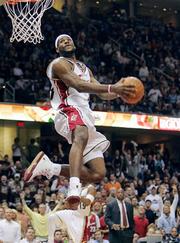 This has been the best basketball post-season in quite some time——I can't even drum up a comparative year, but maybe it will come to me——from the "What the hell?" of LeBron James and the Cleveland Cavaliers pushing Detroit to an unexpected seventh game; to the Phoenix Suns, and two-time MVP Steve Nash, coming back from a 3-1 opening round defecit to knock out the Los Angeles Lakers, and again going seven with the same city's Clippers the following round; to the Bulls——yes, those same seemingly, supposedly hopeless Bulls——pushing Miami to six games, when they were expected to go out in, say, four.
This has been the best basketball post-season in quite some time——I can't even drum up a comparative year, but maybe it will come to me——from the "What the hell?" of LeBron James and the Cleveland Cavaliers pushing Detroit to an unexpected seventh game; to the Phoenix Suns, and two-time MVP Steve Nash, coming back from a 3-1 opening round defecit to knock out the Los Angeles Lakers, and again going seven with the same city's Clippers the following round; to the Bulls——yes, those same seemingly, supposedly hopeless Bulls——pushing Miami to six games, when they were expected to go out in, say, four.And now, with the Dallas Mavericks preparing to host the Miami Heat on Thursday night, I'm torn about who to cheer for——as well as who to pick. I'm going to be satisfied either way, but really, I'm just hoping the series just goes seven games. Actually, I hope the league changes the rules to maybe a best-of-nine, or 11——as it similarly did suddenly in mid-season when it went to a seven-game format in the opening round in 2003 to, more or less, benefit the Lakers and the market of Los Angeles.
But Derek Fisher ended up crying on the bench as the Lakers' hopes for a fourth straight title ended, thanks to the San Antonio Spurs. Boo-hoo.
 I'll be the first to admit that the NBA——over the course of an entire season—is a far cry from the Jordan-era basketball we came to know and love in Chicago. There's a lot of reasons for this: the increase in players preferring one-on-one moves and taking ill-advised shots as to just passing the fucking ball (Exhibit A: Your New York Knicks, ladies and gentlemen); the increasingly gang-banger image associated with recently over-tattoed NBA stars (Exhibit B: Allen Iverson; supplemented by the whole Ron Artest incident); and just a whole lot of universally-agreed mediocre teams over recent years.
I'll be the first to admit that the NBA——over the course of an entire season—is a far cry from the Jordan-era basketball we came to know and love in Chicago. There's a lot of reasons for this: the increase in players preferring one-on-one moves and taking ill-advised shots as to just passing the fucking ball (Exhibit A: Your New York Knicks, ladies and gentlemen); the increasingly gang-banger image associated with recently over-tattoed NBA stars (Exhibit B: Allen Iverson; supplemented by the whole Ron Artest incident); and just a whole lot of universally-agreed mediocre teams over recent years.So, with Jordan and Pippen, we were spoiled.
And that was a point I adamantly made when visiting Los Angeles after the Lakers signed Karl Malone and Gary Payton. It was widely assumed by Californians that L.A. was going to run away with the title in 2004. So all throughout that year's Finals, there was a commentary building in my head that I e-mailed everybody I knew when that year's championship was decided:
"When considering the possibility of moving to an area outside Los Angeles just a little less than a year ago, being critical of the supposed Lakers dynasty during a time their fans felt almost invincible seemed quite fun. When potential roommates would scoff at my Chicago ties and the Bulls dynasty I was proud to be a fan of, the Californians were quick to complement the accomplishment of six NBA titles in eight years before saying, "You don't really think they're as good as the Lakers, do you?"In yesterday's Chicago Tribune, Sam Smith covered NBA Commissioner David Stern saying how complaints against the league's officiating ultimately hurt the game. He ended his first segment—touching on the excessive amount of charging calls—on this paragraph:
Kobe or Michael, Scottie or Shaq. No, I guess I wouldn't have said that those Bulls were "as good as" these Lakers. Actually, my immediate reply was that those Bulls were better than these Lakers.
Hypothetical situations like those can never yield a clear conclusion, only a mere passionate opinion. Regardless, I would assume even Phil Jackson (who would be the head coach of both teams in such a dream game) could agree to the likelihood that any of his six championship teams in the Windy City would have scrubbed the hardwood with any of the group of actors that got him three more rings on the coast.Don't get me wrong. It's been a long, hard season coping with the success of a Detroit Pistons franchise that has done nothing but improve each of the past three seasons—rooting for them this season almost seemed sacrilegious. After all, it was the Motor City that sent those beloved Bulls packing three years in a row at the end of the 80s. Three long years of tough, physical basketball in the Eastern Conference usually stole the show from the NBA Finals, always ending with Jordan's crew coming away with the short end of the stick.Those were the much celebrated "Bad Boys" days in Detroit, a real group of (for lack of a better term) pricks that decided to evacuate their home court when there was still time remaining before the Bulls would sweep the Pistons out of the Eastern Conference Finals and——hopefully——the landscape of the NBA after their fourth consecutive post-season meeting.There were two fellows, however, with enough sportsmanship to acknowledge the better team and shake hands with the victors: John Salley (who actually joined the Bulls for his third ring in 1996) and Joe Dumars. Perhaps they weren't all so "bad" after all.No, Dumars has long been one of the classiest guys in the league, and judging by what he surrounded himself with in Detroit since the days of the thugs he captured back-to-back titles with, he still is. More than 17 years after Al Campanis went on Nightline for the 40th anniversary of Jackie Robinson's major league debut and claimed blacks "may not have some of the necessities" to be a General Manager, Dumars proves African-Americans are capable of being more than just the natural-born athletes stereotype (P.S. Way to go, Larry Bird).
I'll be the first to admit how wrong I was in questioning the decisions made by the President of Basketball Operations for the Pistons. After making the playoffs last year, the Pistons still managed to nab the second pick in the following draft, taking Darko Milicic——and then rubbed it in by having him spend the season on the bench.
They got rid of a coach that turned the team around in Rick Carlisle, replacing him with Larry Brown. After tireless efforts to get Allen Iverson to grow up in Philadelphia failed, Brown was only too happy to inherit Carlisle's squad of ballers——the coach even praised the now Indiana head coach when accepting the Larry O'Brien trophy following Detroit's dominant Game 5 clincher. This season, the squad suddenly started to play a defense that could rival that of the "Bad Boys" era, a force overlooked throughout the season thanks to juicier headlines provided by other teams in the league. Most notably, the glitz of Los Angeles.While the Pistons boasted a roster of hard-working and somewhat less mentioned players similar to Dumars (Ben Wallace, Chauncey Billups, Elden Campbell), fans in Los Angeles were already putting the champagne on ice before the season began.Add two future hall-of-famers to a team that already starts two of the league's biggest stars, and it's hard to argue. When the late-night talk on sports radio in Chicago shifts to a national broadcast, you're often subjected to a host with a distinct favoring of teams in a particular market (either New York or L.A.). After signing both Karl Malone and Gary Payton, the West coast pundits would've made you think that the Lakers were bound to shatter every record in the book. "It's a joke if the Lakers don't win the title," said one Jim Rome wannabe. You'd think.Instead, it was a long soap opera that probably tickled the fancy of as many Laker fans as the rest of the nation. Night after night after night of the same thing. Kobe leaving a trial in Colorado and always managing to somehow arrive at Staples to sink a game-winner. The courtroom in the Rockies almost seemed to be in cahoots with the court of David Stern.There were injuries and childish spats among the team along the way, but the Lakers nabbed the Pacific title on the season's final day in trademark dramatic fashion. The ever-dominant Western Conference (the last Eastern representative to win an NBA Championship? Yeah, you know) seemed but a casual stroll for Los Angeles, so it's easy to understand why they took these Pistons lightly.Why Phil Jackson would treat the Detroit team the same way is another matter——if that were really the case. Rather, the simple truth is (take note here, Yankee fans——you're next) buying celebrated veterans at bargain prices guarantees nothing. Karl Malone and Gary Payton fit into the triangle about as well as William Ligue, Jr. would fit into Kauffman Stadium. Put two tired, old pros in a setting where they're only showing up because they think they're simply entitled to a championship ring, and there'll be twelve guys more determined to prove otherwise.So Karl Malone sat on the bench Tuesday night in his street clothes. Gary Payton was about as much of an impact as he'd have been if he were watching the game from Seattle or Milwaukee. Oh, and Derek Fisher blinked back tears for the second year in a row as an added bonus.Yes, the ratings for the so-so ABC coverage improved from last year. Perhaps it was the marquee talent of that Laker squad, but I'd like to think it might have something to do with improved quality of the product. The Pistons of 2004 recalled the fundamentals of the game that had seemingly disappeared in the past five or so years of flops and complaints for whistles that have dominated the NBA playoffs—this year seemed to be a sort of throwback to when the Bulls drew the numbers for NBC with, well, pretty solid basketball that was entertaining for all.
Detroit or Los Angeles, the NBA or what fans the league has left; to me, it seems like this season, everybody got exactly what they deserved."
"Even though zones are allowed now, hardly anyone plays them for more than a few minutes. Sliding over to get in front of a driver is hardly good defense. It's a trick, and it's time the NBA recognized that."I concur.
But the game is changing for the better, and my prediction is the Mavericks in seven. Whom I root for, however, will likely change on a nightly basis.

